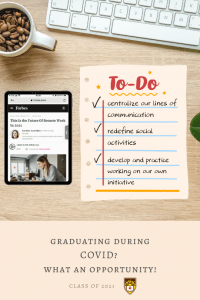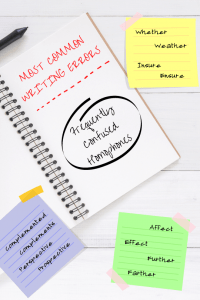By Communication Consultants Duy Nguyen (Accounting and BIS, ’22) and Carolyn Reagan (Accounting, ’23)
 Congratulations to the Class of 2021! You are boldly approaching the end of your four-year journey in the face of demanding academic challenges, coupled with an ongoing global pandemic. While the current situation has seen some encouraging improvements and there are prospects of the Commencement ceremonies being held in person in May, this school year has nevertheless been unprecedented and, oftentimes, unfamiliar and uncomfortable. It especially resonates with our graduating Lehigh Class of ‘21 who may be anxious about dealing with the uncertainties of the future. We must reflect on and be reminded of the numerous skills and knowledge gained during college, even (or especially) because of the pandemic. Knowing how to make sense of and talk about what we have learned will set us apart from others on the job market.
Congratulations to the Class of 2021! You are boldly approaching the end of your four-year journey in the face of demanding academic challenges, coupled with an ongoing global pandemic. While the current situation has seen some encouraging improvements and there are prospects of the Commencement ceremonies being held in person in May, this school year has nevertheless been unprecedented and, oftentimes, unfamiliar and uncomfortable. It especially resonates with our graduating Lehigh Class of ‘21 who may be anxious about dealing with the uncertainties of the future. We must reflect on and be reminded of the numerous skills and knowledge gained during college, even (or especially) because of the pandemic. Knowing how to make sense of and talk about what we have learned will set us apart from others on the job market.
As tiring and repetitive as they might have been, our Zoom calls and conferences have undoubtedly provided us with a silver lining of enhanced communication and collaboration skills. In order to prevent our messages from getting lost in the unending stream of information, we have learnt to centralize our lines of communication, keeping them concise and straightforward. Such skills will definitely be of value in a professional work environment, where efficient correspondence is greatly emphasized. In another sense, throughout the past year, we have redefined the way that we connect with others. Before COVID, we were more dependent on friendships and relationships built upon in person interactions, whether by meeting a friend for coffee or seeing a classmate on the way to the dining hall. The current environment has forced us to redefine our relationships, shifting to Zoom calls, texts, and social distanced outings. We have learned that online friendships and relationships transcend social media.
More importantly, remote working and deadlines have helped us develop and practice working on our own initiative. Not only will the virtue of autonomy shape individuals to be more desirable employees, but it will also contribute to personal self-improvement in daily lives. With time to reflect, many of us have changed the way that we approach our daily lives and self improvement. We have rediscovered old hobbies, learned to be incredibly flexible, and matured in our understanding of the greater global community.
Students who understand how their skills can transfer to new situations are well positioned for a job market in which more companies reportedly are considering a shift to permanent remote work. By 2025, an estimated 70 percent of the workforce will work remotely at least five days a month, making these skills especially valuable. On an even more positive note, hiring of college graduates is projected to be on the rise. Thanks to the increase in businesses reopening and vaccine distribution, employers have seemingly become more optimistic as they project hiring 7.2% more new college graduates from the Class of 2021 than they hired from the Class of 2020, according to a report from the National Association of Colleges and Employers (NACE).
The past year of online courses is a stepping stone towards a future that values remote working and the virtual environment, but also emphasizes the importance of personal relationships, health, and more. Our College years have undoubtedly been filled with challenges, triumphs, memories, and friendships. It is important to consider how they have shaped us and how they will lay a foundation for the next chapter in our lives. Seniors, as you reflect upon the last four, formative years of your life, also take a chance to relax and take a deep breath–you have earned it! Though the future may be uncertain, be confident in all you have achieved, knowing that you have left an indelible mark on your fellow classmates, your community, and Lehigh University! Congratulations to the Class of 2021!
Get information and resources about our center at The Philip Rauch Center for Business Communication.



